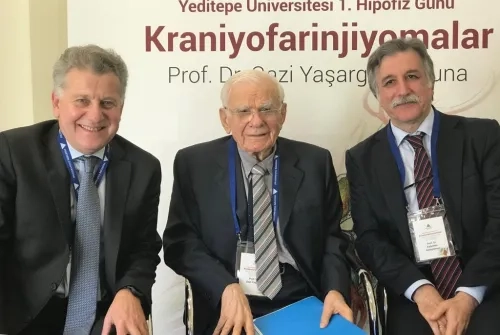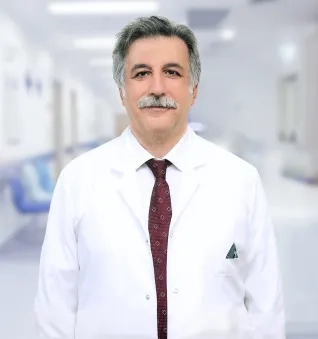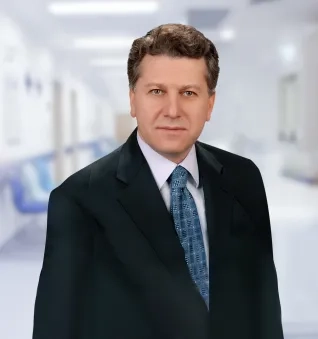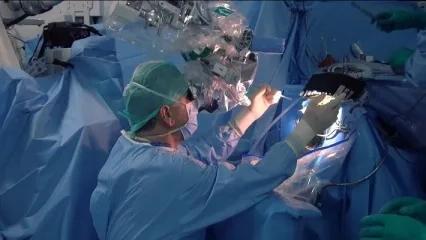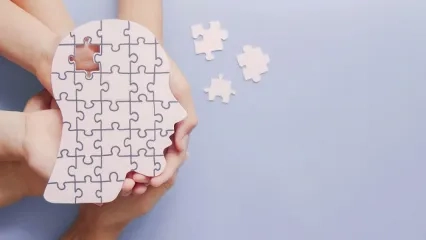Alo Yeditepe
Alo Yeditepe
Treatment Success in Brain Tumors Also Depends on the Family
The 1st Pituitary Days Symposium organized by Yeditepe University was held in Istanbul on Saturday, October 12 with the participation of Prof. Dr. Gazi Yaşargil, who was selected as the most important neurosurgeon of the last century. In the first of the meetings, which are aimed to become traditional, 'Craniopharyngioma' tumors, which are rarely diagnosed and difficult to treat, were discussed. Craniopharyngioma is defined as a rare, benign brain tumor disease that is extremely challenging for the patient and their relatives. These tumors arise from residual tissue in the developmental process of the pituitary gland in the brain. It progresses very insidiously, and its symptoms are often confused with other diseases. Most importantly, about half of the cases are childhood patients. Speaking at the meeting attended by many important scientists from Turkey and abroad, Yeditepe University Faculty of Medicine Head of the Department of Neurosurgery, Prof. Dr. Uğur Türe, said that 50% of the treatment success, especially in children, depends on the attention and care of the family in the post-surgical process.
Leaving Medication For One Day Risks the Life
Prof. Dr. Uğur Türe said, “If the family does not pay attention in the period after the operation, all efforts are wasted. It is very difficult for the family, but some families do it. They pay attention to what their children eat and drink and ensure that they take the medication. Because they know how important it is. For example, if one day he/she does not take his/her medication, we may lose the child. It is such a delicate process. In other words, when you say that there is no medication left in the pharmacy that day, you can buy it tomorrow or something, and you may lose the patient. You should also pay attention to the weight of the child. For example, these children should not eat desserts. Then the child should pay attention to these himself/herself. So, it is a lifelong treatment. Even after the most successful surgery, these patients must pay attention for the rest of their lives.”
A Rare But Tricky Disease
Yeditepe University Hospitals Medical Coordinator and Endocrinology Specialist Prof. Dr. Fahrettin Keleştemur stated, “Its most important characteristic is the sudden cessation of height growth in children. In adults, patients' complaints are mostly in the form of excessive urination and drinking a lot of water. Generally, patients apply to the physician with complaints of this or hormone deficiencies or the effects of the mass, the pressures on the brain tissue, and visual impairment. The main treatment is surgery. There is no very effective medication yet. There are medications developed against molecular disorders, and we want them to be usable in the coming years. One of the biggest problems is that the disease affects the 'hypothalamic region'. This can lead to sleep disorders and appetite disorders. One of the causes of obesity is this tumor. It is really difficult to treat. Sometimes we have to recommend bariatric surgery to these patients.”
Symptoms are Different in Children and Adults
Explaining that craniopharyngioma tumor develops for different reasons in children and adults, Yeditepe University Hospitals Neurosurgery Specialist Prof. Dr. Uğur Türe continued his words as follows: “It is not the same disease in children and adults. We get much better results in adults. In other words, if you remove the tumor completely and protect the hypothalamus, the patient can lead a normal life. Many doctors and high-level bureaucrats lead their lives in this way. You can't notice that they underwent such an operation. However, if the family cannot control this situation, especially in the case of obesity and loss of weight control in children after surgery, it can cause very unsuccessful and bad results even on its own. It is more common in adults in their 30s and 40s. It is more common in children between the ages of 5-10.”
Complete Removal of the Tumor is Required
Prof. Dr. Uğur Türe, who stated that Craniopharyngioma, a benign tumor, is actually one of the most difficult tumors to treat, concluded his words by giving the following information: “Because the surgery is very difficult and you cannot remove it completely, this problem does not end. Since not every surgeon has enough experience, the problem stems from this. The problem in children is that complete resection, that is, a complete removal is necessary so that the child can lead a normal life. But in the meantime, we should not disturb the region that we call the hypothalamus in the child. So, the problem in children is much bigger. Treatment in children is much more difficult.”
This content was prepared by Yeditepe University Hospitals Medical Editorial Board.
”
See Also
- What is Hypoglycemia?
- Causes and Treatment Methods of Cervical Herniated Disc
- Brain / Spinal Cord Spine and Nerve Surgery (Neurosurgery)
- Did You Know That Our Bodies are Managed by Hormones?
- Misconceptions About Hypertension
- Lumbar Spinal Stenosis
- Spinal Fractures
- Narrow Cervical Canal and Myelopathy
- What is Hypertension?
- Chronic Pelvic Pain
- What is Polycystic Ovary Syndrome/PCOS?
- The Hidden Problem Seen in One out of Every 10 Women: HIRSUTISM
- Persistent Headache May Be a Sign of Tumor
- The Purpose of Pituitary Diseases is to Avoid Waste of Time with the Right Treatment
- Pelvic Floor Muscles Should Be Addressed with a Multidisciplinary Approach
- Protect Children From Sports That Will Knock Their Head
- Polycystic Ovary Syndrome Can Occur If the Bacteria in the Gut Are Not Functioning Well
- Doctor Support for the Ban on Heading by Children
- Head Trauma Can Cause Permanent Damage
- Use of Vitamin D in Pregnant Women
- Diabetes Mellitus and its Treatment
- Treatment of Pituitary Adenomas
- Surgical Treatment of Pituitary Diseases
- Pituitary Clinic | FAQs
- What are Pituitary Diseases?
- What is the Pituitary Gland, What are its Functions?
- What is Hirsutism?
- Hirsutism Clinic / FAQs
- Do not Fill Your Brain With Junk Food If You Want A Good Memory
Alo Yeditepe

